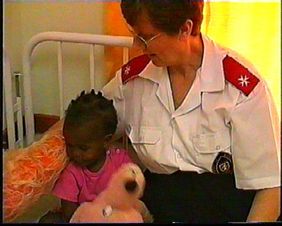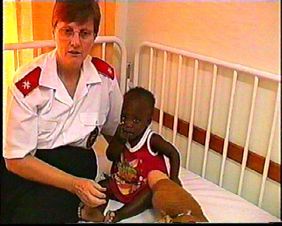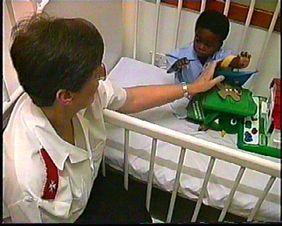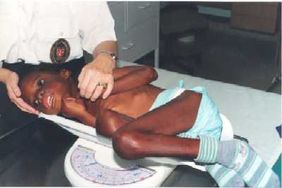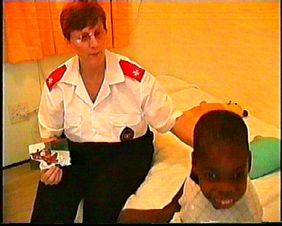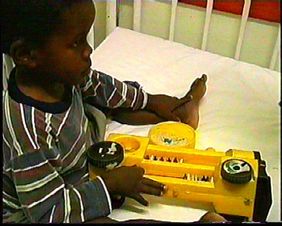Scene from our video film "An Imperishable Brotherhood":
This is Themba. Themba came to us when she was three months old. She was abused by her mother and the social workers took her away from her mother and entrusted her to our care. The social workers are trying to rehabilitate the mother so that Themba can return to her. In the meantime, she stays with us. She has grown and developed like a normal little girl and as you can see, the scar on her leg is almost gone now. She is now one and a half years old and a very happy normal child. This is a photo taken when Themba came to us. You can see a burn on her leg from an iron. This is how she abused her mother. We treated the wound and she is now a wonderful little girl.
OK, this is Nokubonga. Nokubonga was born six weeks premature. When she came to us, she was very malnourished. She was underdeveloped and not growing. Her father did not pay her mother any alimony, so the mother left Nokubonga to her father and left them both. The father had no idea what to do with such a tiny baby and all he fed her was sugar water. Thank God he was sensible enough and went to the social workers. They called us and asked us to take her in and look after her. "Of course we can take her," we said. She is now one and a half years old, has developed splendidly, is well-fed and happy, cheerful and very intelligent, has her own character and does all sorts of things.
Bongani is also one and a half years old now. He was brought to us by his own father because he was malnourished and he is far too small for his age. About a month after Bongani came to us, his mother died of AIDS, not in our hospice but in a government hospital. Bongani's problem is that he suffers from "childhood alcohol syndrome", which means his mother was an alcoholic. She drank and smoked alarmingly during pregnancy. Bongani was much too small when he was born and never reached the right size. As I said, he is one and a half years old and should be twice the size he is now. He is quite an intelligent guy and can learn well. That's why we're happy. We are trying to get him to the point where he starts to grow. Then he will go back to his father who will take care of him.
Mxolisi is now nine years old. He came to us when he was eight years old. He suffers from severe epilepsy. He had a cerebral infarction at birth and therefore he is very mentally retarded. His mother died of AIDS, but thank God he is not HIV positive. When he was admitted, he was half starved and his epilepsy was untreated. He was not given any medicine and so he had four to five seizures a day. This is what he looked like when he was admitted. He weighed only twelve kilos at eight years old and as you can see he was very malnourished. Mxolisi has been with us for over a year. After just a few weeks of good nutrition and constant medication, we got him to the point where he responded. When he came to us he was completely unresponsive. He didn't laugh, he didn't cry, he was never angry, he was never happy. He showed absolutely no emotion and when you waved your hand in front of his eyes, he did not react. As you can see from the pictures, he has improved and developed enormously. He has gained a lot of weight and he is happy. He eats properly and we have pretty much managed his seizures in collaboration with the government hospitals who have helped us admirably. You see, Mxolisi is very happy and will grow up one day.
O.k., this little boy, Thembinkosi, is four years old. He has been with us for a little over a year now. He was here with his mother, both with full blown AIDS. His mother died last week here in our hospice and she asked us on her deathbed that he be allowed to stay with us. The father is untraceable and there are no other family members and so he is a true AIDS orphan. We will take care of him and nurse him until the Lord calls him. Such children usually don't live past the age of ten and so we can at least give him a few good years of life where he can grow and be happy and content with us.
Well, these children in our children's home have different social problems. Some of them are social orphans, some are AIDS orphans and some are HIV positive themselves. We have several children who were abandoned by their parents and then handed over to our care by the government social workers. For example, we have a child who was abandoned at the hospital when he was three months old. His mother brought him there because he was sick, but never picked him up. He grew up in the children's ward of a bush hospital for four years until the social workers heard about Blessed Gérard's Children's Home. They asked us to take him in until they find either adoptive parents or a foster family for him.
There is another child with a very sad story: he was abandoned three times. The first time it was given by its mother to its father, then by the father to the mother of a partner from whom he had separated and who was of course no relative. This woman then abused the child. She left him neglected and finally abandoned him with us. The poor little boy was far behind in his development, he was malnourished and he had wounds all over his body. Now he has settled in well. He goes to the local kindergarten and does quite well there. His physical development has improved a lot and he has grown completely into the community.
We have another brother and sister who were abused by their alcoholic parents. The social workers have entrusted them to our care to keep them safe until they will find a final solution to their problems, most likely a foster family.
Because of all these social problems, many of which are AIDS related - parents die of AIDS and children are abandoned for financial reasons because the father or mother died of AIDS and are left with the grandmother. The grandmother also dies and the children have to be raised by their eleven or twelve year old siblings. These children need a home. Such children have been entrusted to our care by social workers, parents, brothers, sisters, uncles, aunts, or by the police or by people who themselves are at a loss. They cannot cope financially with their own families and now they are being asked to take responsibility for other people's children.
